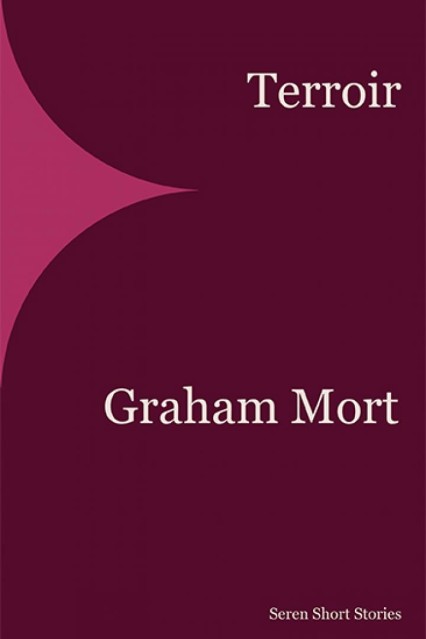Rhys Milsom reviews Terroir, a collection of short stories by award-winning writer and academic Graham Mort.
When you take into consideration Graham Mort’s accolades and accomplishments, it’s difficult to understand why he isn’t spoken about and regarded as highly as he should be in the literature world. He is a prolific writer. A writer who can boast about turning his hand to both prose and poetry to great effect. A writer who has, evidently, got the ability to streamline and condense both so that his style doesn’t differ too far from each form. He is also a prize-winning writer: Eric Gregory award, Bridport Prize, Edge Hill Prize, Short Fiction Magazine International Short Story Prize.
accolades and accomplishments, it’s difficult to understand why he isn’t spoken about and regarded as highly as he should be in the literature world. He is a prolific writer. A writer who can boast about turning his hand to both prose and poetry to great effect. A writer who has, evidently, got the ability to streamline and condense both so that his style doesn’t differ too far from each form. He is also a prize-winning writer: Eric Gregory award, Bridport Prize, Edge Hill Prize, Short Fiction Magazine International Short Story Prize.
As if his belt isn’t heavy enough, he can also add considerable academic research projects to it, including the British Council-funded Crossing Borders and Radiophonics. These projects have seen Mort travel to Uganda, Malawi, Nigeria and Zimbabwe to name a few where he worked with developing African writers. Mort has also been Writing Fellow at the University of the Western Cape in South Africa where he managed to write a substantial manuscript on the book this review is based on – Terroir.
Terroir can be loosely translated as ‘a sense of place’ and this is extremely apt with the characteristics of this collection of short stories. With the majority of his work, Mort focuses on the natural environment and the people in it, and reduces the products of that environment down to dense, subtle form which is both startling and intriguing in its contrasts and content. Terroir is a natural progression from his other work and is both poetic and stark in its style, structure and narrative.
The collection opens with the title story, ‘Terroir’. The piece focuses on its protagonist, André, a rising star in the winemaking industry. He has travelled to rural France to work on producing wine on a farm, overseen by the shadowy and menacing boss, Gaspard. While working on the farm, André falls in love with Gaspard’s wife, Ghislaine, and treads deep into territory which no man ever should with a married woman. However, Andre’s fantasies about Ghislaine become more and more unsettling and wild, resulting in the reader never truly knowing what is real and what isn’t. Ghislane is depicted as a woman who can either ruin or make a man, a woman who is dangerous to be around whilst, at the same time, ensuring a man becomes obsessed with her:
She came up behind him, rubbing his arms gently, electrifying them. He tried not to turn around. He could smell her skin, her hair.
The ending is precisely crafted. A build up of disconcerting events lead to a constant hum of menace surrounding the story and Mort guides us to the finale as if he is escorting us by the arm, It’s not rushed, it’s not cliché, it is a resounding conclusion to a story which unnerves yet charms the reader throughout.
‘Angie’ is a bittersweet piece which is centred on a war veteran, Steve, walking home through darkening countryside whilst thinking about his time at war and his wife, Angie. Mort very cleverly switches from Angie to war with simple page breaks, resulting in a cinematic and gratifying read. Not everyone can relate with war experiences so Mort ensures everybody can indeed relate to the story with delicate, flashing narratives of Steve’s most precious memories of him and Angie: ‘He’d lean in to kiss her cheek, the dimple on her chin, her hair always in the way.’, ‘She held her coffee cup in both hands and smiled across to him through the steam, her eyes amazing him again.’, ‘The scent and taste of her, the softness of skin and silk as scarf and hair got tangled in the kiss.’
Mort juxtaposes these images with harsh, brutal depictions of Steve’s time at war: ‘When they turned over the bodies, one of them was a girl and still alive.’, ‘The round had blown out a big hole that welled with blood.’, ‘Len’s throat spouting as the impact spun him to the ground.’
What we have here is a story which is both brutal and beautiful. It’s a story which allows you to be taken away to another world, a world Mort has created for reading pleasure and context.
‘The Glover’ is an intriguing piece which allows your imagination and personal feelings about a person employed by war to thread and knead between the story, crafting your own thoughts on what the unnamed protagonist looks like. We find out that he is – assumedly – an interrogator of sorts, an experienced one at that, who tells us about his experiences and techniques when tasked with getting prisoners to speak. He seems like a pleasant enough character, yet at the core of this story is the damning notion that he has probably (as Mort indicates) done more damage to people of war with his charismatic conversation than actual soldiers have with their guns, bombs and fists. The character is a tricky one to prise open. Do we like him? Are we supposed to like him? That’s up to the individual reader to decide. Mort uses visceral imagery whilst calming the reader with matter-of-fact narration, combining to fill the reader with dread then being softly pushed back into the story, hushed in like a latecomer to the theatre.
Examples of the visceral content are: ‘A man having his penis skinned back’, ‘A fat guy flayed to the spine’, ‘A woman with her breasts hanging by a thread of flesh’. Examples of the calming narration are: ‘He lay in the dark now, listening to the forest seethe around him’, ‘Next week he’d return to the Institute from this period of research leave.’
Graham Mort has assembled a short story collection which, undoubtedly, should allow his talent to be noticed by the masses. Whilst dense and deep at times, which may result in a short story having to be read twice, each piece delves into human characteristics that all of us can relate to and connect with. Mort’s knack of pinpointing characters which thrum off the page makes for a collection which you feel privileged to read. You almost feel the experiences each character has gone through when finished, leaving you dazzled and affected.
Terroir by Graham Mort is available at Seren Books.
Rhys Milsom is a Welsh poet and creative writing tutor.











